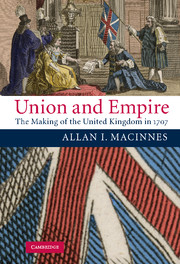Book contents
- Frontmatter
- Contents
- Acknowledgements
- List of abbreviations
- Part I Setting the Scenes
- Part II Varieties of Union, 1603–1707
- 3 Precedents, 1603–1660
- 4 Projects 1661–1703
- 5 The Irish dimension
- Part III The Primacy of Political Economy, 1625–1707
- Part IV Party Alignments and the Passage of Union
- Part V Conclusion
- Appendix
- Bibliography
- Index
4 - Projects 1661–1703
Published online by Cambridge University Press: 09 July 2009
- Frontmatter
- Contents
- Acknowledgements
- List of abbreviations
- Part I Setting the Scenes
- Part II Varieties of Union, 1603–1707
- 3 Precedents, 1603–1660
- 4 Projects 1661–1703
- 5 The Irish dimension
- Part III The Primacy of Political Economy, 1625–1707
- Part IV Party Alignments and the Passage of Union
- Part V Conclusion
- Appendix
- Bibliography
- Index
Summary
Formally restored to independence in 1660, Scotland continued to operate as a junior political partner to England, albeit with greater participation of Scots in the process of government than in the 1650s. The Scottish Council at Whitehall, a devolved committee of the English Privy Council, demarcated Scotland's provincial standing while serving as a channel for the constitutional settlement in Scotland to follow English practice. Though not immediately required by Charles II, Presbyterianism was duly abandoned in favour of Episcopalianism. Notwithstanding the duplicitous dealings of leading clerics to secure themselves bishoprics, the driving force behind this change to the religious establishment was the Scottish nobility, led by former Britannic Engagers such as the future Duke of Lauderdale. Their dominance in the revived Scottish Privy Council was fortified by unflinching support from the restored judiciary. Although Lauderdale was not the foremost political influence within Scotland at the outset of the Restoration, he soon turned the mendacity, venality and chicanery rampant throughout the regime to his personal advantage. His ascendancy, which terminated the Scottish Council, led to his personal exercise of provincial government from 1667. Over the next decade, Scotland again served as a political laboratory. English fears that Lauderdale was using Scotland as a model for absolutism on the cheap were not groundless. Simultaneously, he exploited an exaggerated climate of religious dissent in the Lowlands and social disorder in the Highlands.
Information
- Type
- Chapter
- Information
- Union and EmpireThe Making of the United Kingdom in 1707, pp. 80 - 105Publisher: Cambridge University PressPrint publication year: 2007
